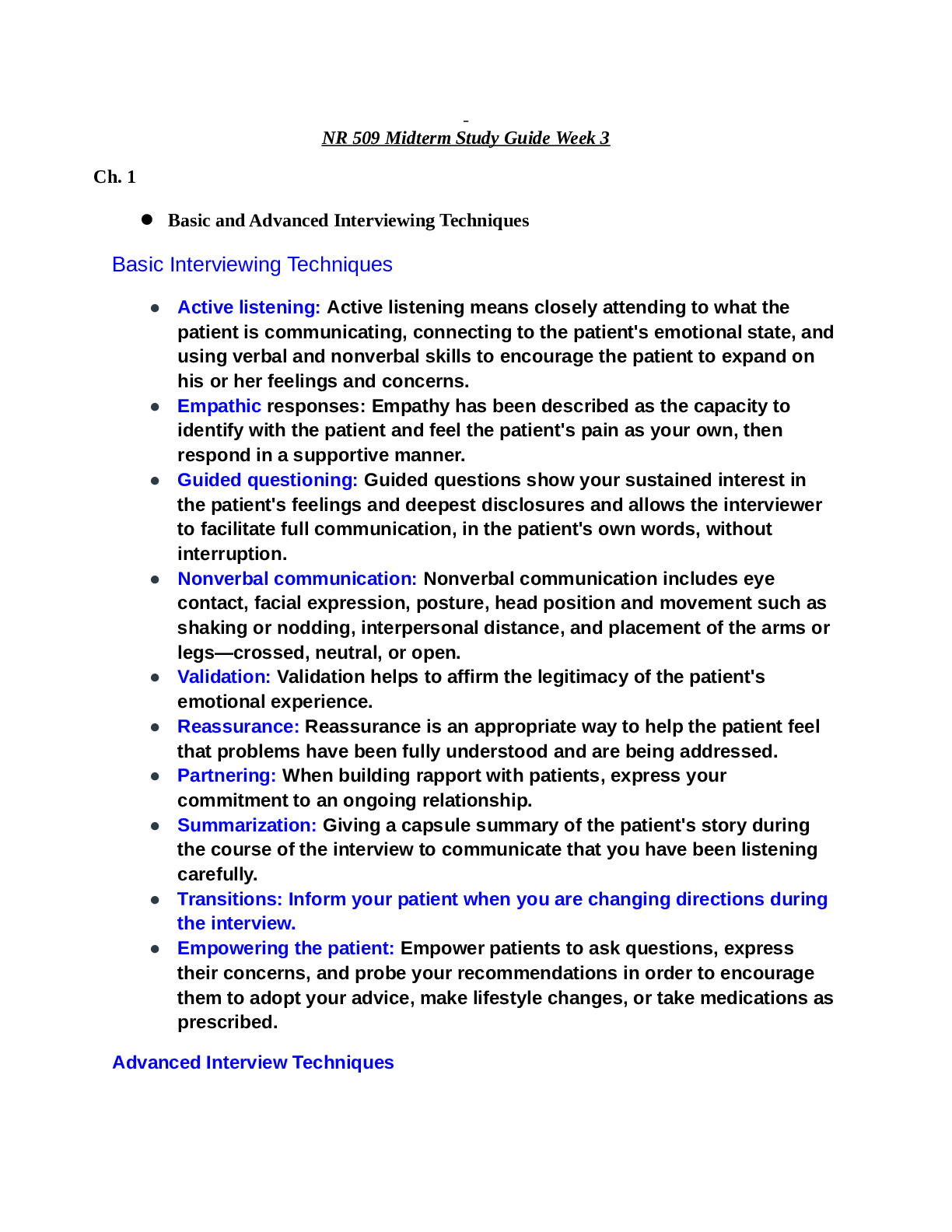*NURSING > Solutions Guide > NR 509 / NR509Midterm Study Guide Week 3 Graded A (All)
NR 509 / NR509Midterm Study Guide Week 3 Graded A
Document Content and Description Below
NR 509 Midterm Study Guide Week 3 Ch. 1 Basic and Advanced Interviewing Techniques Basic Interviewing Techniques ● Active listening: Active listening means closely attending to what the pat... ient is communicating, connecting to the patient's emotional state, and using verbal and nonverbal skills to encourage the patient to expand on his or her feelings and concerns. ● Empathic responses: Empathy has been described as the capacity to identify with the patient and feel the patient's pain as your own, then respond in a supportive manner. ● Guided questioning: Guided questions show your sustained interest in the patient's feelings and deepest disclosures and allows the interviewer to facilitate full communication, in the patient's own words, without interruption. ● Nonverbal communication: Nonverbal communication includes eye contact, facial expression, posture, head position and movement such as shaking or nodding, interpersonal distance, and placement of the arms or legs—crossed, neutral, or open. ● Validation: Validation helps to affirm the legitimacy of the patient's emotional experience. ● Reassurance: Reassurance is an appropriate way to help the patient feel that problems have been fully understood and are being addressed. ● Partnering: When building rapport with patients, express your commitment to an ongoing relationship. ● Summarization: Giving a capsule summary of the patient's story during the course of the interview to communicate that you have been listening carefully. ● Transitions: Inform your patient when you are changing directions during the interview. ● Empowering the patient: Empower patients to ask questions, express their concerns, and probe your recommendations in order to encourage them to adopt your advice, make lifestyle changes, or take medications as prescribed. Advanced Interview Techniques 2 Determine scope of assessment: Focused vs. Comprehensive: ■ Comprehensive: Used patients you are seeing for the first time in the office or hospital. Includes all the elements of the health history and complete physical examination. Is appropriate for new patients in the office or hospital Provides fundamental and personalized knowledge about the patient Strengthens the clinician–patient relationship Helps identify or rule out physical causes related to patient concerns Provides a baseline for future assessments Creates a platform for health promotion through education and counseling Develops proficiency in the essential skills of physical examination ■ Focused: For patients you know well returning for routine care, or those with specific “urgent care” concerns like sore throat or knee pain. You will adjust the scope of your history and physical examination to the situation at hand, keeping several factors in mind: the magnitude and severity of the patient’s prob- lems; the need for thoroughness; the clinical setting—inpatient or outpatient, primary or subspecialty care; and the time available. [Show More]
Last updated: 1 year ago
Preview 1 out of 41 pages
Instant download

Buy this document to get the full access instantly
Instant Download Access after purchase
Add to cartInstant download
Reviews( 0 )
Document information
Connected school, study & course
About the document
Uploaded On
Mar 17, 2022
Number of pages
41
Written in
Additional information
This document has been written for:
Uploaded
Mar 17, 2022
Downloads
0
Views
75



